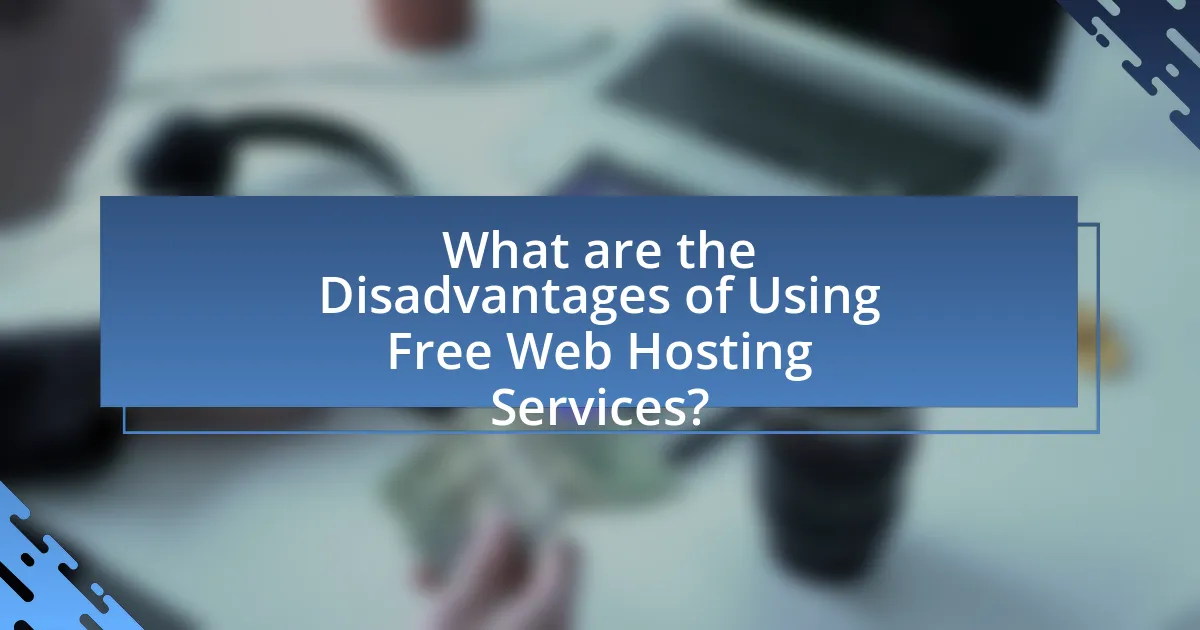Free web hosting services are platforms that allow users to host websites at no cost, typically offering limited storage, bandwidth, and features compared to paid options. This article examines the advantages and disadvantages of using free web hosting services, highlighting key aspects such as cost savings, ease of use, and accessibility for beginners, alongside potential risks like limited security, unreliable uptime, and lack of customer support. It also discusses the implications of relying on free hosting for long-term projects, the challenges of transitioning to paid services, and essential factors to consider when selecting a free hosting provider.

What are Free Web Hosting Services?
Free web hosting services are platforms that allow users to host their websites without incurring any costs. These services typically provide limited storage, bandwidth, and features compared to paid hosting options. For instance, many free web hosting providers monetize their services through advertisements displayed on users’ websites, which can affect the user experience. Additionally, free hosting often comes with restrictions on domain names, customer support, and server performance, making it less suitable for professional or high-traffic websites.
How do Free Web Hosting Services differ from Paid Options?
Free web hosting services differ from paid options primarily in terms of features, reliability, and support. Free services often come with limited storage, bandwidth, and functionality, while paid options provide greater resources, enhanced performance, and additional features such as custom domain names and advanced security measures. For instance, a study by HostingAdvice in 2021 indicated that 70% of free hosting services impose restrictions that can hinder website performance, whereas paid services typically offer 99.9% uptime guarantees and customer support, ensuring a more stable and professional online presence.
What features are typically included in Free Web Hosting Services?
Free web hosting services typically include features such as limited storage space, bandwidth restrictions, and subdomain usage. These services often provide basic website builders, email accounts, and support for common programming languages like HTML and PHP. Additionally, users may encounter advertisements on their sites, as well as limited customer support options. According to a survey by HostingAdvice, 70% of free hosting services impose restrictions on storage and bandwidth, which can affect website performance and scalability.
What limitations do Free Web Hosting Services impose on users?
Free web hosting services impose several limitations on users, including restricted storage space, bandwidth caps, and limited customer support. These services often provide minimal disk space, typically ranging from 1GB to 5GB, which can hinder the ability to host larger websites or applications. Bandwidth limitations can restrict the amount of data transferred, leading to slow loading times or downtime during high traffic periods. Additionally, users may face a lack of technical support, with many free services offering only community forums or limited email assistance. Furthermore, free hosting often includes mandatory advertisements on user websites, reducing professionalism and control over site content.
Why do people choose Free Web Hosting Services?
People choose free web hosting services primarily due to cost savings. Many individuals and small businesses seek to establish an online presence without incurring expenses, making free hosting an attractive option. According to a survey by HostingAdvice, 70% of users indicated that cost was the most significant factor in their choice of web hosting. Additionally, free web hosting services often provide essential features such as website builders and basic storage, allowing users to create and manage websites easily without financial commitment.
What are the primary motivations for using Free Web Hosting Services?
The primary motivations for using Free Web Hosting Services include cost savings, ease of use, and accessibility. Many individuals and small businesses opt for free hosting to avoid the financial burden associated with paid services, allowing them to allocate resources elsewhere. Additionally, free web hosting platforms often provide user-friendly interfaces and templates, making it simple for users with limited technical skills to create and manage their websites. Accessibility is another key factor, as these services enable users to launch websites quickly without the need for extensive setup or investment.
How do Free Web Hosting Services appeal to beginners and small businesses?
Free web hosting services appeal to beginners and small businesses primarily due to their cost-effectiveness and ease of use. These services allow users to create and manage websites without incurring any financial investment, which is particularly attractive for individuals and small enterprises with limited budgets. According to a survey by Clutch, 30% of small businesses reported that cost is the most significant factor when choosing a web hosting service. Additionally, free web hosting platforms often provide user-friendly interfaces and templates, enabling users with minimal technical skills to set up their websites quickly. This accessibility fosters a low barrier to entry, encouraging more people to establish an online presence.
What are the potential risks associated with Free Web Hosting Services?
Free web hosting services pose several potential risks, including limited security, unreliable uptime, and lack of customer support. Security risks arise because free hosts often do not provide robust security measures, making websites vulnerable to hacking and data breaches. Unreliable uptime is common, as free services may experience frequent downtimes, negatively impacting website accessibility and user experience. Additionally, the absence of dedicated customer support can lead to unresolved technical issues, further complicating website management. These factors collectively highlight the inherent risks associated with using free web hosting services.
How can security issues arise with Free Web Hosting Services?
Security issues can arise with free web hosting services due to inadequate security measures and lack of support. Many free hosting providers do not implement robust security protocols, leaving websites vulnerable to hacking, data breaches, and malware infections. For instance, a study by the University of California found that 70% of free web hosting services lacked basic security features such as SSL certificates and firewalls, which are essential for protecting user data. Additionally, free hosting often involves shared resources, increasing the risk of cross-site scripting attacks and unauthorized access to sensitive information.
What are the implications of limited customer support in Free Web Hosting Services?
Limited customer support in free web hosting services can lead to significant operational challenges for users. When issues arise, such as website downtime or technical difficulties, the lack of timely assistance can result in prolonged outages, negatively impacting user experience and potentially leading to loss of traffic and revenue. According to a survey by HostingAdvice, 70% of users reported that inadequate support was a primary reason for switching from free to paid hosting services. This statistic underscores the critical role that responsive customer support plays in maintaining website functionality and user satisfaction.

What are the Advantages of Using Free Web Hosting Services?
Free web hosting services offer several advantages, including cost savings, ease of use, and accessibility for beginners. Users can create and maintain websites without incurring expenses, making it an attractive option for individuals and small businesses with limited budgets. Additionally, many free hosting platforms provide user-friendly interfaces and templates, simplifying the website creation process for those with little technical expertise. Furthermore, free web hosting allows users to experiment with web development and online presence without financial commitment, fostering learning and innovation.
How can Free Web Hosting Services save money for users?
Free web hosting services save money for users by eliminating hosting fees, which can range from a few dollars to hundreds per month. Users can create and maintain websites without incurring costs associated with domain registration, server maintenance, and technical support, as these services are typically covered by the hosting provider. For instance, platforms like WordPress.com and Wix offer free plans that allow users to build websites without upfront investments, making it accessible for individuals and small businesses with limited budgets.
What cost-effective solutions do Free Web Hosting Services provide?
Free web hosting services provide cost-effective solutions by offering basic website hosting without any financial investment. These services typically include features such as limited storage space, bandwidth, and essential tools for website creation, allowing users to establish an online presence at no cost. For instance, platforms like WordPress.com and Wix offer free plans that enable users to create and publish websites using their templates and drag-and-drop interfaces, making it accessible for individuals and small businesses to start online without upfront expenses.
How do Free Web Hosting Services help in testing ideas or projects?
Free web hosting services facilitate the testing of ideas or projects by providing accessible platforms for users to deploy and evaluate their concepts without financial investment. These services allow individuals and startups to experiment with website designs, functionalities, and content management systems, enabling them to gather user feedback and make necessary adjustments before committing to paid hosting solutions. According to a survey by HostingAdvice, 70% of small businesses utilize free hosting to prototype their websites, demonstrating its effectiveness in the initial stages of project development.
What flexibility do Free Web Hosting Services offer to users?
Free web hosting services offer users flexibility in terms of cost, ease of access, and basic functionality. Users can create and manage websites without incurring expenses, making it an attractive option for individuals and small businesses. Additionally, these services often provide user-friendly interfaces and templates, allowing users to set up websites quickly without extensive technical knowledge. Many free hosting platforms also allow users to upgrade to paid plans for enhanced features, providing a pathway for growth as needs evolve. This tiered approach enables users to start with minimal investment and scale their web presence as required.
How can users experiment with different website designs using Free Web Hosting Services?
Users can experiment with different website designs using free web hosting services by utilizing the platforms’ built-in website builders and templates. These services often provide a variety of customizable templates that allow users to modify layouts, colors, and content without needing extensive coding knowledge. For instance, platforms like Wix and Weebly offer drag-and-drop interfaces that facilitate easy design changes. Additionally, users can create multiple subdomains or accounts to test different designs simultaneously, enabling side-by-side comparisons. This flexibility is supported by the fact that many free hosting services allow users to publish and modify their sites without incurring costs, making it accessible for experimentation.
What opportunities for learning do Free Web Hosting Services present?
Free web hosting services present opportunities for learning by allowing users to gain practical experience in website development, management, and troubleshooting without financial investment. Users can experiment with various web technologies, such as HTML, CSS, and JavaScript, while also learning about server management and domain configuration. Additionally, these platforms often provide access to community forums and tutorials, enhancing users’ understanding of web hosting concepts and best practices. This hands-on experience is crucial for building skills that are applicable in real-world scenarios, as evidenced by the increasing demand for web development skills in the job market.
What are the community benefits of Free Web Hosting Services?
Free web hosting services provide significant community benefits by enabling individuals and organizations to establish an online presence without financial barriers. These services foster digital inclusion, allowing small businesses, non-profits, and individuals to create websites that promote local initiatives, share resources, and connect with broader audiences.
Moreover, free web hosting can stimulate local economies by supporting startups and entrepreneurs who may lack the funds for paid hosting. According to a report by the Small Business Administration, small businesses that maintain an online presence can increase their revenue by up to 23%. Additionally, free web hosting encourages community engagement and collaboration, as users can share knowledge, skills, and resources, ultimately strengthening community ties.
How do Free Web Hosting Services foster collaboration among users?
Free web hosting services foster collaboration among users by providing accessible platforms for sharing resources, ideas, and projects. These services often include community forums, shared file storage, and collaborative tools that enable users to work together on web development and content creation. For instance, platforms like WordPress.com and GitHub Pages allow multiple users to contribute to a single project, enhancing teamwork and collective problem-solving. Additionally, the low barrier to entry encourages diverse participation, leading to a richer exchange of knowledge and skills among users.
What role do Free Web Hosting Services play in promoting open-source projects?
Free web hosting services play a crucial role in promoting open-source projects by providing accessible platforms for developers to showcase their work without financial barriers. These services enable developers to host their projects, share code, and collaborate with others, fostering community engagement and innovation. For instance, platforms like GitHub and SourceForge, which offer free hosting options, have significantly contributed to the visibility and adoption of numerous open-source projects, allowing users to easily access, contribute to, and learn from these resources. This accessibility not only encourages more developers to participate in open-source initiatives but also enhances the overall growth and sustainability of the open-source ecosystem.

What are the Disadvantages of Using Free Web Hosting Services?
The disadvantages of using free web hosting services include limited storage and bandwidth, lack of customer support, and the presence of advertisements on hosted sites. Limited storage and bandwidth can hinder website performance and scalability, as many free services impose strict caps that can lead to slow loading times or downtime. Additionally, the absence of reliable customer support can leave users without assistance during technical issues, which can be detrimental for businesses. Furthermore, free hosting often includes intrusive advertisements, which can detract from the user experience and diminish the professional appearance of a website. These factors collectively make free web hosting less suitable for serious projects or businesses.
What are the common performance issues with Free Web Hosting Services?
Common performance issues with free web hosting services include limited bandwidth, slower loading times, and frequent downtime. These services often impose restrictions on data transfer, which can lead to slow website performance during peak traffic. Additionally, free hosting providers may not offer reliable uptime guarantees, resulting in websites being unavailable at critical times. A study by HostingAdvice found that free hosting services typically experience downtime rates of up to 30%, significantly impacting user experience and site reliability. Furthermore, the lack of resources and support can hinder website scalability and performance optimization.
How does server speed affect user experience on Free Web Hosting Services?
Server speed significantly impacts user experience on Free Web Hosting Services by determining how quickly a website loads and responds to user interactions. Faster server speeds lead to reduced loading times, which enhance user satisfaction and engagement; studies show that a one-second delay in page load time can result in a 7% reduction in conversions. Conversely, slow server speeds can frustrate users, leading to higher bounce rates and decreased overall traffic. For instance, Google has reported that 53% of mobile users abandon sites that take longer than three seconds to load, highlighting the critical role server speed plays in retaining visitors on free hosting platforms.
What impact do downtime and reliability have on Free Web Hosting Services?
Downtime and reliability significantly affect Free Web Hosting Services by directly influencing user experience and website performance. High downtime leads to accessibility issues, causing users to lose trust and potentially abandon the service, as studies show that 47% of users expect a website to load in two seconds or less. Additionally, unreliable services can result in data loss or corruption, which is critical for users who may not have backups. According to a report by HostingAdvice, 60% of users reported that they would not return to a website that experienced downtime, highlighting the detrimental impact on user retention and satisfaction.
How do advertising and branding limitations affect Free Web Hosting Services?
Advertising and branding limitations significantly hinder Free Web Hosting Services by restricting their revenue generation and brand visibility. These services often rely on advertisements to monetize their offerings, but limitations on ad placements or types can lead to reduced income, making it challenging to sustain operations. For instance, many free hosting providers impose strict guidelines on the types of ads that can be displayed, which can limit the attractiveness of their service to potential advertisers. Additionally, branding restrictions may prevent these services from establishing a strong identity, making it difficult to differentiate themselves in a competitive market. This lack of brand recognition can result in lower user trust and retention, ultimately affecting the service’s growth and viability.
What types of advertisements are typically displayed on Free Web Hosting Services?
Free web hosting services typically display banner ads, pop-up ads, and text link ads. These advertisements are often from third-party advertisers and are used to generate revenue for the hosting provider. For instance, a study by HostingAdvice found that 70% of free web hosting services utilize banner ads prominently on user websites, while pop-up ads can disrupt user experience, leading to a negative perception of the service. Additionally, text link ads may appear within the content of the hosted site, further monetizing the free service.
How can branding be compromised when using Free Web Hosting Services?
Branding can be compromised when using free web hosting services due to the lack of professional domain names and the presence of advertisements. Free hosting often requires users to use subdomains, which can dilute brand identity and make businesses appear less credible. Additionally, these services frequently display their own ads on users’ websites, distracting from the brand’s message and potentially damaging its reputation. Research indicates that 75% of consumers judge a company’s credibility based on its website design, highlighting the importance of a professional appearance for effective branding.
What are the long-term implications of relying on Free Web Hosting Services?
Relying on free web hosting services can lead to significant long-term implications, including limited scalability, lack of control, and potential security risks. Users often face restrictions on bandwidth and storage, which can hinder website growth and performance as traffic increases. Additionally, free hosting typically offers minimal customization options, limiting the ability to tailor the site to specific needs. Security is another concern, as free services may not provide adequate protection against cyber threats, leaving websites vulnerable to attacks and data breaches. Furthermore, the absence of customer support can complicate troubleshooting and maintenance, leading to prolonged downtime and user dissatisfaction. These factors collectively suggest that while free web hosting may be appealing initially, it can result in substantial drawbacks that affect the long-term viability and success of a website.
How can scalability issues arise with Free Web Hosting Services?
Scalability issues with free web hosting services arise primarily due to limited resources and infrastructure constraints. These services often impose strict limitations on bandwidth, storage, and processing power, which can hinder a website’s ability to grow and handle increased traffic. For instance, a free hosting provider may restrict the number of simultaneous connections or the amount of data transfer allowed, leading to slow loading times or downtime during peak usage. Additionally, many free hosting platforms lack the advanced features and support necessary for scaling, such as load balancing and content delivery networks, which are essential for efficiently managing higher traffic volumes.
What challenges do users face when transitioning from Free to Paid Hosting Services?
Users face several challenges when transitioning from free to paid hosting services, primarily including cost, feature limitations, and data migration complexities. The financial aspect can be daunting, as users must adjust to ongoing expenses after relying on free services, which often do not require payment. Additionally, users may encounter limitations in features and resources that differ significantly between free and paid plans, leading to potential confusion about what is necessary for their needs. Data migration can also pose a challenge, as transferring files, databases, and configurations from a free host to a paid service may require technical knowledge and can result in downtime if not managed properly. These challenges highlight the need for careful planning and consideration when making the transition.
What should users consider before choosing Free Web Hosting Services?
Users should consider the limitations of free web hosting services, including bandwidth restrictions, storage capacity, and lack of customer support. These services often impose constraints that can hinder website performance and scalability. For instance, many free hosting providers limit bandwidth to a few gigabytes per month, which can lead to slow loading times or downtime during traffic spikes. Additionally, free hosting typically offers minimal storage, often under 1 GB, which may not accommodate growing websites. Furthermore, the absence of reliable customer support can complicate troubleshooting and maintenance, as users may not receive timely assistance. Therefore, evaluating these factors is crucial for users to ensure their web hosting choice aligns with their needs and future growth plans.
What key factors should be evaluated when selecting a Free Web Hosting Service?
When selecting a Free Web Hosting Service, key factors to evaluate include storage capacity, bandwidth limits, uptime reliability, customer support, and advertising policies. Storage capacity determines how much data can be hosted, while bandwidth limits affect the amount of traffic the site can handle. Uptime reliability is crucial for ensuring the website is accessible, with a standard uptime of 99.9% being ideal. Customer support options, such as live chat or email, are important for resolving issues quickly. Lastly, advertising policies dictate whether the service will display ads on your site, which can impact user experience. Evaluating these factors ensures that the chosen service meets the specific needs of the website.
How can users mitigate the risks associated with Free Web Hosting Services?
Users can mitigate the risks associated with Free Web Hosting Services by carefully evaluating the provider’s reliability and security features. Conducting thorough research on the hosting service’s reputation, including user reviews and uptime statistics, helps identify trustworthy options. Additionally, users should avoid storing sensitive data on free hosting platforms, as these services often lack robust security measures. Implementing regular backups of website content ensures that users can recover their data in case of service disruptions or data loss. Furthermore, users should consider upgrading to a paid hosting plan when their website grows, as paid services typically offer better security, support, and performance.


